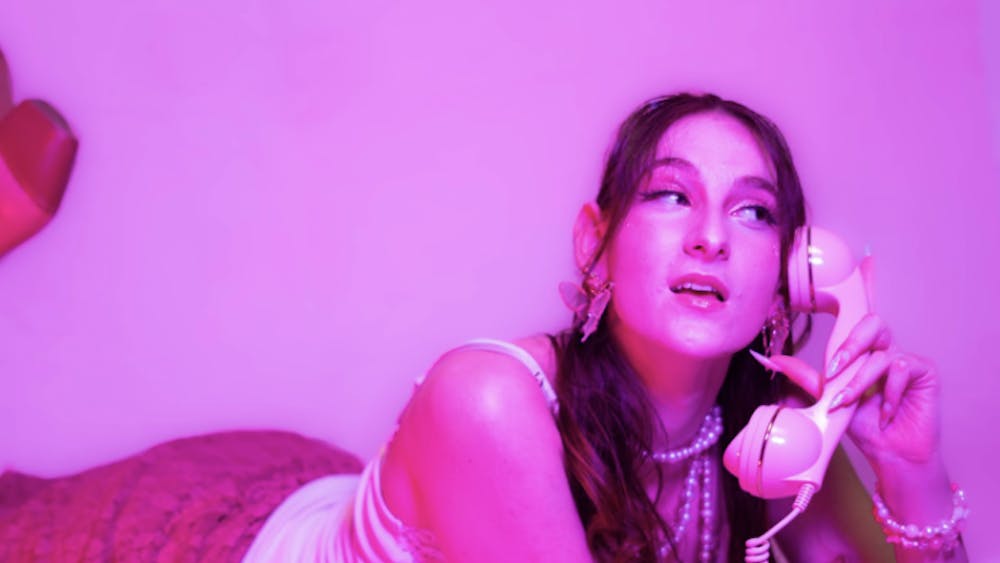
When we think of “Peter Pan,” we think of the magical enchantment of the lovely flying little boy and his fairy friend Tinker Bell who sprinkles glitter pixie dust. But Assistant Professor of Dramatic Writing Kimberly Belflower’s “Lost Girl,” thought more of Wendy Darling, the girl who went on adventures with Peter Pan.
From Sept. 28 to Oct. 1, a little bit of magic and an overwhelming amount of life lessons filled Schwartz Center for Performing Arts’ Theater Lab as Theater Emory put on “Lost Girl” for four consecutive days. Belflower wrote and directed the story, which follows Wendy’s (Emory MacLaughlin, 24C) coming-of-age journey of moving on from her picturesque times with Peter (Sam Hanson, 25C) and learning how to let go of the past in the process.
The Theater Lab welcomed the audience with a dreamy set of Wendy’s nursery, decorated with a projected pink back wall, foggy lights, purple window curtains and soft animal plushies on her bed, where Wendy sat reading a book. A hanging star from the ceiling stood out as the audience anticipated the show to start while listening to Olivia Rodrigo’s newest heartbreak album “GUTS.”
Peter’s entrance onto the stage, accompanied by a sparkling sound effect, marked the opening scene of the show, which introduced the audience to Wendy’s sweet adventures with Peter. Narrating that she allows herself eight minutes a day to think about Peter, Wendy soon introduced the audience to her sadness after Peter did not come back to meet her in the real world.
Various characters attempted to break Wendy out of her sorrow, including her mother (Maya Nair, 25C) and the Lost Boys: Slightly (Rehema Karuri, 26C), Toodles (Noah Lian, 23Ox, 25C), Nibs (Zachary Gunter, 24C) and Curly (Sofia Freedman, 25C). The Lost Boys’ frequent humorous commentary on Wendy’s conflicting opinions brought laughter to the audience, especially with each of their distinct characters. Lian’s portrayal of Toodles’ playful and carefree personality stood out as he played with Wendy’s plushies on her bed while listening to her weighty troubles.
Wendy took the audience through a relatable journey of emotions. In a heightened quarrel with her mother, Wendy questioned the concept of happiness that everybody tells her to achieve. Her turmoil concerning the fragility of happiness — as opposed to sadness that she called “steady and strong” — represents many of the fundamental questions that we all have faced in life. Through Wendy’s voice, “Lost Girl” addresses the pressure to sustain happiness, the fear of growing up and the pain of moving on from a bygone relationship.
Belflower and the cast made several notable creative choices in delivering the play’s plot and message. One was the use of body movements to accompany the dramatic script. When the people in Wendy’s town aggressively pointed at her as an immature, helpless victim of kidnapping, the rumors surrounding the girl built up dramatically as actors scattered and moved across the stage in choreographed movements.
Leading up to the climax of the performance, Wendy broke out of her shell to reevaluate her relationship and memories with Peter, describing them to the other girls (Erin Devine, 25C; Makalee Cooper, 23Ox, 25C; Emi Fernandez, 24C) he took out to adventures. The girls, whose pronounced performances caught both Wendy and the audience’s attention in this crucial turning point, broke to Wendy that Peter had already grown up.
With their help, Wendy, whose face still lights up whenever she thinks of her very first time meeting Peter, finally gained the courage to say at last that she “won’t wait anymore.” In an exceptional performance, MacLaughlin delivered this line with the utmost sincere tone. She displayed powerful contrasting emotions in these scenes, conveying Wendy’s character development.
No scenes of the play were predictable, but the script especially surprised the audience with Peter’s sudden appearance from the corner of the theater right after that moment of Wendy’s determination to move on. The audience gasped and frowned at Peter’s seemingly grown-up and unpleasantly changed attitude toward Wendy. It was as if they were all rooting for her to make the justified choice to move on.
Unlike the rest of the cast who went through numerous costume changes throughout the play to suit their various roles and scenes, Wendy stayed in her misty blue nightgown, designed by costume designer Jen Madison. Her costume change out of her sparkly nightgown and into a more dull and casual outfit signaled Wendy’s change and growth during that moment.
The tense lack of lines exchanged between Wendy and Peter in their final encounter scene emphasized the distance between the two characters. However, this final encounter did not change the fact that Wendy and Peter were special to each other in their journeys to becoming mature adults.
As the ex-adventure pair were about to share a kiss, a dramatic lighting change descended upon the two characters. At long last, when Wendy finally closed her windows, the theater was soaked in silence and focused on MacLaughlin’s bittersweet facial expressions.
“Lost Girl” took us through the imagined story beyond the horizon of the well-known “Peter Pan” tale, powerfully telling the story of the girl who not only had to grow up but also to move on from her first love. Over a focused set and placid stage effects, profound dialogues between characters and the cast’s emotional delivery struck the room, “Lost Girl” took the audience through Wendy’s journey of growing up and learning to embrace a farewell.








